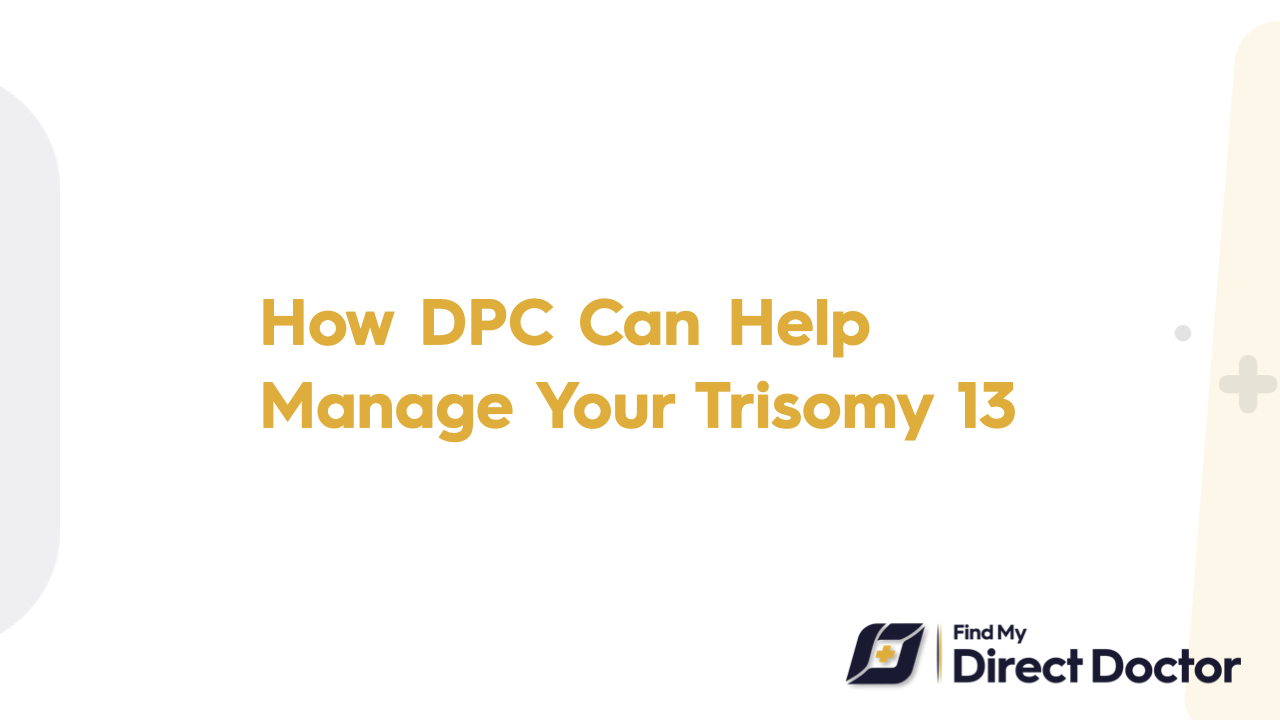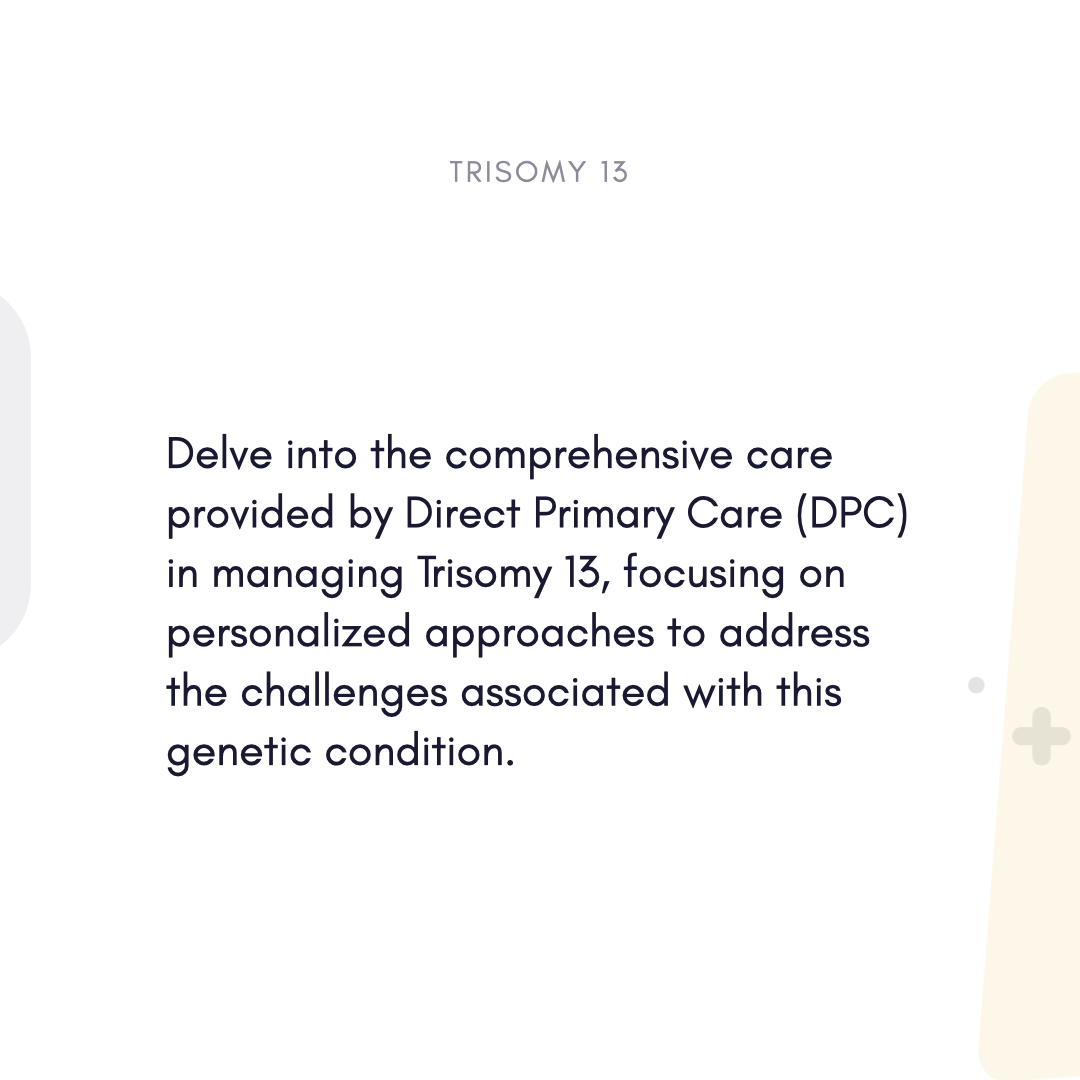Trisomy 13 (Patau Syndrome) and Direct Primary Care (DPC): Compassionate, Coordinated Care for Fragile Lives
If you have ever experienced the heartbreak of a Trisomy 13 diagnosis, you are aware of the enormous logistical, emotional, and physical obstacles it presents. Affecting one in sixteen thousand newborns, this rare genetic condition calls for specific, round-the-clock treatment. Direct Primary Care (DPC) presents a lifeline for families, though, combining fast access to pediatric knowledge, cost transparency, and comprehensive support during this delicate journey.

Recognizing Trisomy 13 and Its Difficulties
With an extra 13th chromosome in trisomy 13, one gets:
- Severe congenital abnormalities: cleft lip/palate (60%), holoprosencephaly (80%), heart problems.
- Ninety percent of the life-limiting prognosis comes within the first year.
- Needs for care: regular hospital visits for problems with feeding, infections.
- Coordinating palliative care.
- Resite help and family counseling.
How DPC Changes Trisomy 13 Administration
Under the membership arrangement known as Direct Primary Care (DPC), which usually runs 50 USD–150 USD, families pay a monthly fee for unrestricted access to their primary care physician. For Trisomy 13 families, this means care concentrated on quality of life, no surprise bills, and no waiting days for urgent consults.
DPC distinguishes itself for the following:
1. Pediatric Expertise Available 24/7
DPC doctors follow AAP recommendations including:
- Immediate triage: Evaluating seizures and respiratory discomfort.
- Reflux protocols and NG tube management provide feeding support.
- Planning for comfort: hospice coordination, pain management.
2. Reasonably priced multidisciplinary coordination
- By working with home health agencies for nursing care, DPC clinics help to lower costs.
- Offering palliative medications—like morphine—at wholesale rates.
- Bargaining for specialized consults—cardiologists, neurologists—cash rates.
3. Comprehensive Family Assistance
Families having continuous DPC access can:
- Get sibling support and grief counseling.
- Get references for respite care for caregiver relief.
- Using ethics consultations, negotiate difficult medical decisions.
DPC Benefits for Trisomy 13 Families
Customized Plans of Care
- During a visit, DPC doctors dedicate hours to creating plans including:
- Symptom-based techniques: Control apnea and seizures.
- Plans of feeding: thickened formulas and milk forteners.
- Celebrating milestones means catching happy moments among difficult circumstances.
Savings on Cost
- No co-pays for regular house calls or telehealth consultations.
- Medically complicated care bundles at 40–60% less than conventional models.
- Prevention of unwarranted ER visits by means of aggressive symptom control.
Perfect transitions in care.
DPO guarantees:
- Coordination of hospitals: Noting records for palliative teams or NICUs.
- Creating memory boxes, hand/foot casts is legacy building.
- Bereavement support links families to infant loss groups.
Real-Life Situations:
- Case 1: Using DPC's 24/7 advice on controlling her daughter's seizures at home, the Smiths avoided five ER trips in two months.
- Case 2: Supported by the hospice coordination of their DPC doctor, Baby Emma's family received compassionate end-of-life care at home.
Ask questions about DPC and Trisomy 13.
- Q: Can DPC manage crises including respiratory failure?
- A: While coordinating EMS, DPC doctors guide families through crises to guarantee comfort-oriented treatment.
- Q: Is DPC within reach for households regularly visiting hospitals?
- A: Surely. Flat-rate pricing reduces financial stress during crises by covering unlimited consults.
- Q: What if we require genetic counseling for next pregnancies?
- A: A DPC links families to fertility experts and geneticists for preconcept planning.
DPC Is a Win for Trisomy 13 Families: Why
Family-centered care for life-limiting conditions is stressed by the American Academy of Pediatrics. DPC produces this by:
- Giving access top priority: Help right away during midnight fevers or trouble breathing.
- Empowering families: advocacy and symptom control education.
- Honoring decisions: Supporting the particular care path chosen by every family, whether comfort-oriented or curative.
DPC helps you to walk beside your child, honoring their life, lightening your load, and enabling you to treasure every priceless moment.






